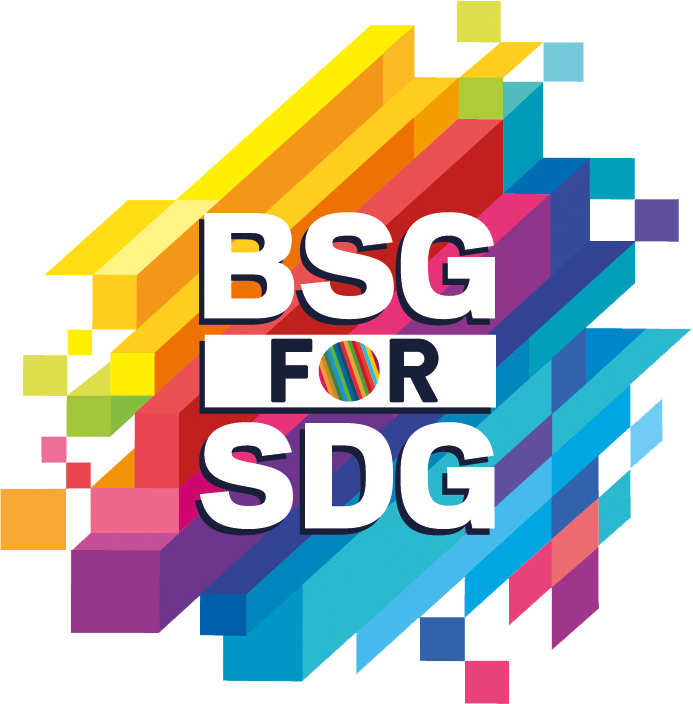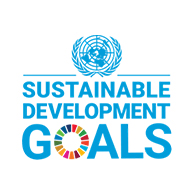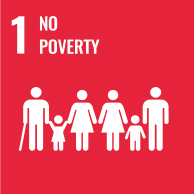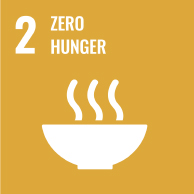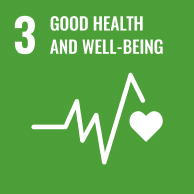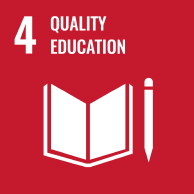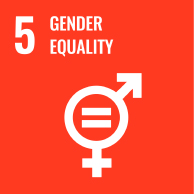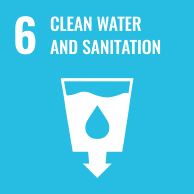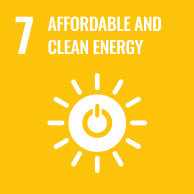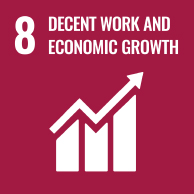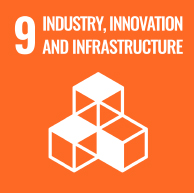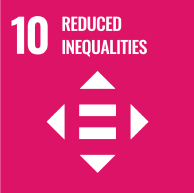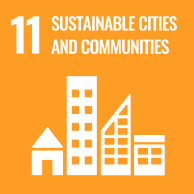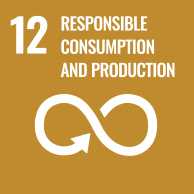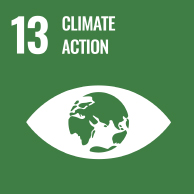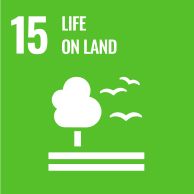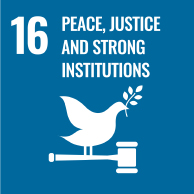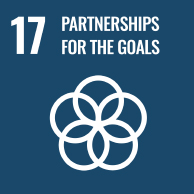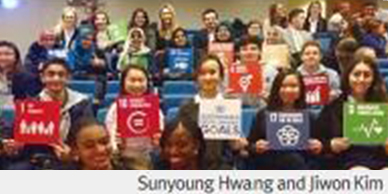Greetings from BSG Chairperson
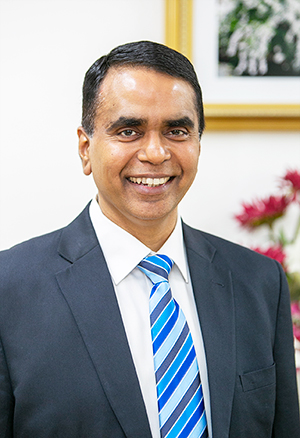
Dear Members of Bharat Soka Gakkai and All Readers,
My heartfelt wishes to you and your family members on the new year. A new year brings with it new hope and an opportunity to make new determinations. I hope this year will bring immense joy and good health in your lives.
While there were many challenges the world faced in 2021, members of BSG continued to blaze new trails to lead a more sustainable lifestyle. Many members shared testimonials of how they have been making conscious efforts to adapt ‘Sustainable Human Behaviour’ in various aspects of their life. As a result, they were able to lead a very contributive, value creating and joyful life, despite the unprecedented circumstances that prevailed. I am certain that 2022 will be an even more eventful year where we will all continue to make greater efforts in leading a more sustainable life.
The focus of this third edition of the ‘SUSTAINABLE’ newsletter is “Youth and Sustainable Development Goals (SDGs)”, which resonates closely with Soka Gakkai’s theme for 2022, which is ‘The Year of Youth and Dynamic Progress’. Young people are the hope of the world; hence nurturing them and building a solidarity of awakened and empowered youth is not only a prerogative of government and leaders; it is our shared responsibility.
This issue will focus on how the SDGs affect the youth particularly, and the role they can play in creating a global civilization where no one is left behind.
SGI President Daisaku Ikeda calls on young people to use their passion and energy to illuminate the place they inhabit with the warmth of their friendship. President Ikeda shares in his 2020 Peace Proposal, “The path to resolving the problem of climate change and achieving the SDGs will not be smooth or easy. However, I am deeply confident that as long as there is solidarity among youth, there is no impasse we cannot surmount.”
In this third issue of ‘SUSTAINABLE’ newsletter, we will learn about why youth are important stakeholders for accomplishing the SDGs, reflect on the role and mission of youth in the transformation towards more sustainable societies, and empower each other to create positive chain reactions of change right where we are through inspiring testimonials of youth members of BSG. We hope you will draw hope and inspiration from this issue in your own sustainable journey. I look forward to hearing your views and experiences of how you are living a sustainable life.
Best wishes once again for the new year to you and your families!
Warm regards
Vishesh Gupta
BSG Chairperson
There are around 1.8 billion people between the ages of 10-24 – the largest generation of youth in history. Close to 90% of them live in developing countries, where they make up a large proportion of the population (United Nations). Young people have a central role to play in achieving sustainable, inclusive and stable societies by 2030. Not only because it is their future at stake but also because the promise of youth – their passion, idealism and spirit of challenge, is essential for delivering the promise of ‘leaving no one behind’ in this process.
Youth have played a crucial role in even shaping the SDGs for which views of a range of stakeholders were taken. Out of 8 million people who participated in the surveys taken regarding priority areas of engagement, nearly 70% were under 30 years of age (UN & SDGs: A Handbook for Youth).
In fact, the Youth and the 2030 Agenda for Sustainable Development identifies young people as active architects and change-makers of sustainable global societies. It identifies 5 roles that young people can play in achieving the SDGs:
- Youth as critical thinkers who have the capacity to identify and challenge existing power structures and barriers to change, and to expose contradictions and biases
- Youth as change-makers who can mobilize others to act using social media tools.
- Youth as innovators who can offer new ideas and alternative solutions.
- Youth as communicators who can relate the development agenda to their peers, local communities and beyond.
- Youth as leaders, who, when empowered with the knowledge of their rights and equipped with leadership skills, can drive positive change in the society.
However, global crises such as migration, climate change, war and pandemic have disproportionately affected young people. In his Foreword to the Progress Report 2021 on Youth2030, UN’s first-ever, system-wide strategy on youth, Secretary General Antonio Guterres points out that in 2020 alone, COVID-19 pandemic caused learning loss for more than 168 million students, one in four young people were rendered jobless, and hundreds of millions of children and young people experienced mental health crises of some sort. Young women were particularly affected by the increased burden of care work, lost economic opportunities and were at greater risks of violence.
These challenges are grave and complex, yet the world shines with exemplars who have risen above their circumstances such as the 29 refugee athletes who participated in the 2020 Tokyo Olympics, bringing glory and pride to their homelands and host countries. Young people around the world are showing the way forward by developing youth-led solutions, catalysing change through community-led solutions and advocacy.
To realise the SDGs, we need to involve youth in all stages of change-making as equal partners, and not just as token participants, and create the necessary conditions for their full and active participation.

Equity
The Buddhist principle of cherry, peach, plum and damson expounds that despite our uniqueness and diversity as human beings, we all are equally worthy and capable of leading a life of dignity and value creation.
Most of us are familiar with the concept of equality, broadly understood as the ‘state of being equal’, or ‘getting equal rights or opportunities in life’. However, in reality, people’s starting point in life vary tremendously. For instance, a child raised in an English-speaking household will find it easy to adjust and learn in an English medium school, as compared to a child raised in a non-English speaking household. Equality is when both children find admission in an English medium school. However, due to the language constraint, the second child may face learning difficulties if the teachers are not mindful of his/her language needs and therefore, do not pay greater attention to bridge this language gap. In other words, the second child will not be able to reap the full benefit of this equal opportunity.
This is where equity comes into play. Equity means providing a platform to people to thrive in a way that’s best suited to them, in the right proportion, in order to create a level playing field. In the above given example, this would mean providing more support to the second child so that he/she too can enjoy his/her learning like the first child who already has a headstart in life (also understood as privilege).
Although the aim of both equality and equity is to create a just and fair society, equality relates to treating everybody equally irrespective of their circumstances, whereas equity recognizes people’s unique circumstances and challenges, i.e. their differing starting point, and calls for bridging this starting gap through multiple approaches.
It can be said that equity is a necessary condition for building a fair and equal world.
 To Read
To Read
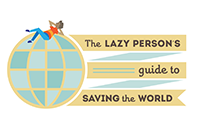
“The Lazy Person’s Guide to Saving the World”
This is a resource created by the UN especially for young people, to inspire action on the SDGs. Few of the many ways to do this have been divided into four levels – Level 1: Things you can do from your couch; Level 2: Things you can do at home; Level 3: Things you can do outside your house; Level 4: Things you can do at work. Click here to explore this guide!
 To See
To See
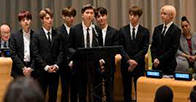
Korean Youth Pop Band ‘BTS’ Speaking Up For Future Generations:
In 2021, The President of the Republic of Korea, President Moon Jae-in appointed world famous Korean youth pop band ‘BTS’ as Republic of Korea’s Special Presidential Envoys for Future Generations and Culture. As Special Envoys, BTS attended the 76th United Nations General Assembly in September 2021 where they made an inspiring speech on behalf of youth at the ‘SDG Moment’ (an event designed to bring attention to the SDGS) about climate change, the digital community, vaccines and the power of youth to change the future. In their speech they said that rather than thinking of youth as the ‘COVID lost generation’, the term ‘welcome generation’ is more suitable, because instead of fearing change, this generation says ‘welcome’ and keeps pushing ahead. Click here to hear their speech.Click here to listen to their speech
Subsequently, BTS along with President Moon spoke with the UN’s Under-Secretary-General for Global Communications, Melissa Fleming, about their commitment to helping advance progress on SDGs through the United Nations.
Click here to watch the interview and get inspired by the youth band To Listen
To Listen
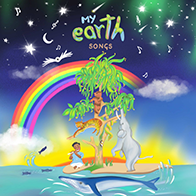
“My Earth Songs”:
My Earth Songs is a set of 27 songs for young children all connected to the SDGs. This initiative of Grammy Award winner Ricky Kej, supported by UNICEF, has been created to raise awareness on how to conquer the world’s greatest challenges, from how we treat the Earth to how we treat each other. Music inspires, music unites! Click here to learn more!
 To Play
To Play
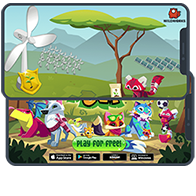
“Green Game Jam”:
You thought video games are just for fun? Well think again. Well designed video games can also be great tools for learning about any subject or topic. Check out these cool video games on environment and sustainability curated by Playing for the Planet Alliance as part of their Green Game Jam. This is a novel joint initiative by United Nations Environment Programme (UNEP) PlayMob and GRID Arendal.
PresidentIkeda highlights in his 2017 Peace Proposal, “The ability to solve problems is not something reserved for special people: It is a path that opens before any of us when we face reality head-on, taking up some aspect of its weighty burden and acting with persistence.”
President Ikeda also shares in his 2014 Peace Proposal, “[The work of building a new world] is a process by which the people themselves, through their own efforts, take on the challenge of realizing a new era of peace and creative coexistence. This is the necessary precondition for a sustainable global society, a world in which all people–above all, the members of future generations–can live in the full enjoyment of their inherent dignity as human beings.”
Such an undertaking, he shares, will require value creating and unified efforts by the inhabitants of the 21st century – and hence it becomes clear why youth have such a key role to play in building such a world.
Pointing to the strength of youth, President Ikeda shares in his 2017 Peace Proposal, “Young people in particular are blessed with a fresh sensitivity and a passionate seeking for ideals. Their energy can catalyze chain reactions of positive change as they forge bonds of trust among people.” He further adds, “Although there is no legal obligation to achieve the SDGs, they are imbued with the hope of transforming our world. When a growing number of young people make the realization of that hope their personal vow and take action based on it, efforts to achieve all of the goals will be greatly energized.”
These chain reactions of positive change based on hope can be created starting with one’s immediate context and surroundings.
President Ikeda explains, “…….for young people, the vision of the SDGs–to leave no one behind–is not something to be achieved in a distant place or a goal for some time in the future. The SDGs point to the present realities of living together on this one planet with our fellow human beings, a way of life dedicated to the daily effort of building a society in which the joy of living is shared by all. When youth make the determination to illuminate the corner of the world they inhabit now, it brings into being a space of security in which people can regain hope and the power to live….” (2017 Peace Proposal)
While the path to address the complex challenges of society and achieve the SDGs can seem daunting, the passion of youth can surely turn the tide. “Young people should always consider what problems everyone is facing and what needs to be done to develop their communities. And they should think outside the box to find creative solutions. You cannot change anything if you just give up thinking it’s impossible. Decide that you’ll find a way to do it, then keep racking your brains, challenging yourselves and persevering through trial and error. Having that passion will change the times. That is the mission of youth.” (The New Human Revolution, Volume 30, ‘Cheers of Victory’ Chapter)
President Ikeda also highlights in his 2017 Peace Proposal how the “magnetic field of friendship” can “enable the functioning of an inner compass when we have lost our sense of direction and help us right society when it seems to be veering off course.”
Amidst increasing divisiveness in society, which has further exacerbated the challenges humanity confronts, friendship and solidarity amongst the youth can become a powerful force to transform society.
While there is very naturally anger and frustration amongst the youth to see progress towards various global crises not taking place at the pace that it needs to, and especially since it is the youth of today and generations that follow whose future stands at stake, President Ikeda highlights in his 2020 Peace Proposal, that “…..when young people’s will to transform society merges with an indomitable optimism, the possibilities are limitless.” In this very crucial Decade of Action to deliver on the SDGs, which is a collective pledge of humanity to wipe out misery in all its forms and bring humanity to ‘several life changing zeros’, including zero poverty, zero hunger, zero discrimination, and so on, young changemakers from across the globe are rising to the challenge to take action. When young people, awakened to their mission to lead such a contributive life (that is not just focused on one’s own wellbeing, but also directed towards wellbeing of people and our planet) take action in their own unique way, we can be confident of the waves of inspiration this will generate towards the accomplishment of the SDGs.
Advocating for Mental Health as a Human RightSurabhi Bhandari | Young Women’s Division | Delhi
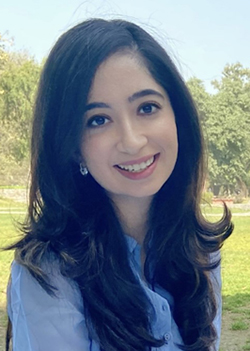
Encouraged by Soka Gakkai International President Daisaku Ikeda on how a strong mental state exerts a positive influence on the body, I aligned my personal goals with ‘SDG3: Good Health and Wellbeing’, which recognizes mental illness as a major challenge towards sustainable development, and launched an online mental health initiative titled ‘Unashamed’. With a focus on education and community engagement, we empower individuals to eliminate the shame attached to mental health. Our knowledge-based content has encouraged many youth to have dialogues with their peers and seek professional help to overcome their personal challenges. One of the aims of this initiative is to make mental health resources more accessible to all strata of the society, including through training workshops and providing treatment at a minimal cost. We are in the process of developing an online system which advances this goal.
As a lawyer, I also noticed the lack of legal representation for mentally ill patients. In addition, both patients and caregivers are often oblivious to the rights available to them under law. Towards this, I have centered my Masters’ thesis on analysing our domestic mental health laws to determine whether mental health is recognized as a fundamental human right and suggest possible reforms, in case of any gaps. I am also developing an online database of lawyers under our mental health initiative to offer legal services to such patients and caregivers.
Appreciating my knowledge in a class where I discussed themes from President Ikeda’s Peace Proposals, my professor, who is a pioneer with the UN, has invited me to contribute to his publications on strengthening and reforming the UN and its agendas. Our research forms part of ‘SDG16: Peace, Justice and Strong Institutions’, which focuses on building effective inclusive institutions at all levels. I will strive my utmost to accomplish SDG3 and SDG16 towards 2030.
Putting Education into Action for the Betterment of HumankindVardaan Shekhawat | Young Men’s Division | Delhi
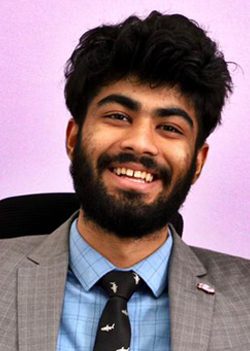
It was while pursuing my undergrad in Political Science in 2017 that I was inspired by these words from SGI President Daisaku Ikeda, which he shared as a guide for university students: “For what purpose should one cultivate wisdom? May you always ask yourself this question!” Studying President Ikeda’s writings made me reflect deep within my life about the purpose of my education, and I wondered how I can use my qualifications to benefit humankind. I then determined to dedicate my life towards addressing some of the vital challenges facing humanity, such as those encapsulated by the SDGs. Incidentally it was at that time that I was selected to be part of a research project that required me to work with children suffering from distinct degrees of PTSD (Post-Traumatic Stress Disorder) and chronic illnesses like cancer, tuberculosis etc.
As I worked with these children and experienced their challenges first hand, it further strengthened my determination to work towards realizing a better world and alleviate needless suffering. It was with this sense of purpose that I established my NGO – “Project uP” with the aim of contributing towards the welfare of children, education and the society overall. Since its inception, our field initiatives for education and development have touched the lives of over 170 children and we have done over four on-field events. Furthermore, looking to support research amongst college students, in partnership with UNESCO, New Delhi, we have trained over 400 college students and helped them become published scholars contributing to SDG 4: Quality Education. Here, for my work in development and capacity building, I was conferred with the prestigious ‘Indian Achievers Award for Young Entrepreneur’. Started with a loan, “Project uP” has now become a self-sustaining organization which creates earning opportunities for others. Our team was invited for a special session hosted by the Youth Action Hub – a direct youth led body working under UNCTAD (United Nations Conference on Trade and Development). We received letters of appreciation and acknowledgment for our policy work from multiple stakeholders including the Standing Committee Chairman and Members of Parliament. Our current policy engagement is putting us in direct conversation with a union ministry.
During this time, in addition to my NGO, I was also able to work as a Faculty Associate in a renowned university in Niger, one of the poorest countries in the world beset with widespread hunger and poverty because of a history of military conflict. Through my work here, I was able to help over 200 students through innovative projects and course modules, keeping in heart the principles of humanistic education propagated by President Ikeda, which focuses on believing in each student’s inherent and unique potential. I could further establish a fully running project in Niger aimed at education and peace which got recognized for incubation by the country’s largest incubator. I was also recently accepted by Oxford University to study Sustainable Development. I am determined to develop myself to the limits of my ability and become the driving force to breakthrough solutions towards achieving the SDGs by 2030!
 SDG Tip for Daily Life
SDG Tip for Daily Life

Wait! Don’t throw away your old clothes yet. Why not repurpose them? Check out these two links for some cool ways to repurpose old garments from Better India and Good on You.
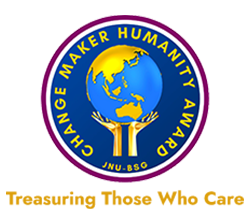
Updates
Change Maker Humanity Award:
Jaipur National University (JNU) has launched a new initiative in association with Bharat Soka Gakkai, called the ‘Change Maker Humanity Award’. This initiative aims to honor unsung protagonists in the fields of Education, Medical & Community Healthcare and Social Services from the State of Rajasthan with an overarching emphasis on the Sustainable Development Goals.
The award is focused on shining the light on those individuals who are silently and selflessly working behind-the-scenes to support humanity, in sync with the SDGs. It reflects the shared vision of both organizations who are working towards a more humane and equitable society by focusing on achieving the SDGs. The award will be an annual feature, starting with Rajasthan and will eventually spread across India. Individuals, teams, and institutes in Rajasthan (who fulfil the criteria) can be nominated for this award.
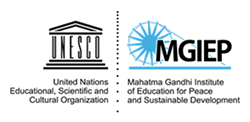
BSG and UNESCO MGIEP join hands to train educators and youth on Climate Change:
Bharat Soka Gakkai partnered with UNESCO Mahatma Gandhi Institute of Education for Peace and Sustainable Development (MGIEP) to conduct two workshops on its Climate Change: Understand, Reflect, Analyse and Act course between 7-11th November 2021.
A total of over 800 students and teachers from across India participated in these workshops with a determination to address climate change through informed individual action. After the orientation meeting, many school and college students, as well as educators shared how they were able to clearly perceive their emotions around climate change and felt empowered to take action to lead a more sustainable life.
Contact Us
Any queries or suggestions regarding the newsletter can be addressed to sdg@bharatsokagakkai.org
To know more about the ‘BSG for SDG’ initiative, visit our website: https://www.bharatsokagakkai.org/bsg-for-sdg/
